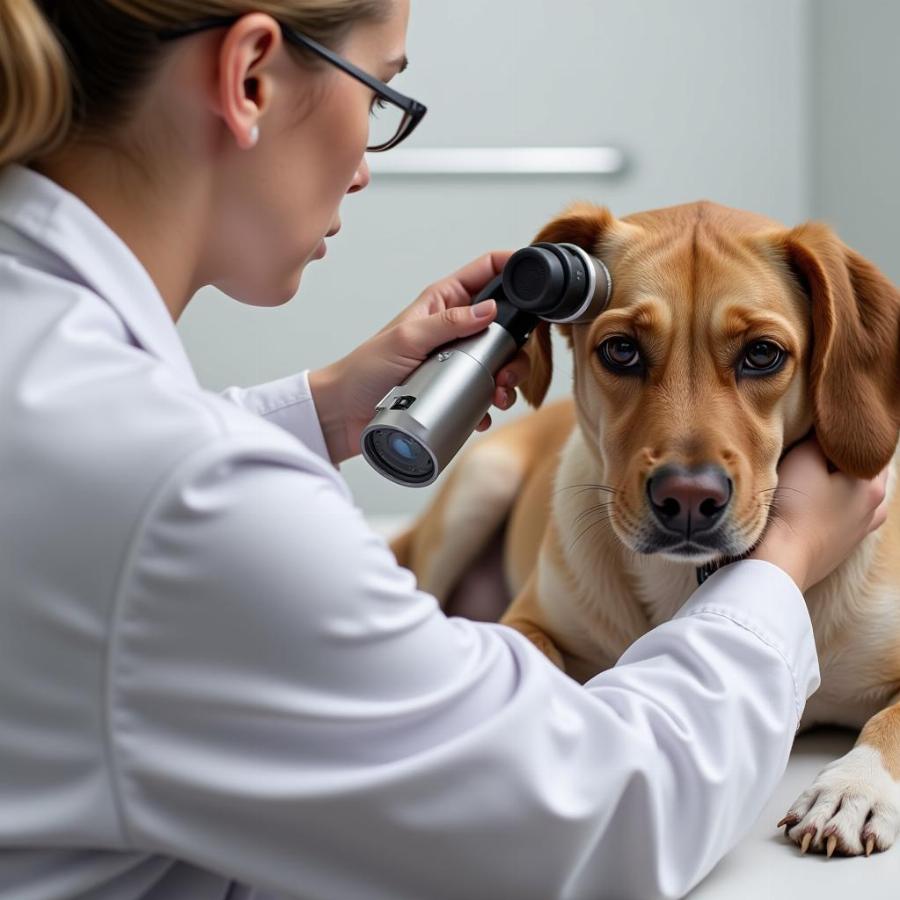Swelling in a dog’s ear can be alarming for any pet owner. This article will delve into the various reasons why your dog might be experiencing swelling in their ear, discuss accompanying symptoms, and outline treatment options. Understanding the potential causes of dog ear swelling, from allergies to infections, is crucial for effective treatment and your furry friend’s comfort.
Understanding the Causes of Swelling in Dog’s Ear
Several factors can contribute to swelling in a dog’s ear. These include:
- Ear Infections: One of the most common culprits of a swollen dog ear is an infection, often caused by bacteria or yeast. These infections can be painful and may also cause your dog to scratch excessively, leading to further inflammation and swelling. dog chronic ear infection offer valuable insights into this common issue.
- Allergies: Just like humans, dogs can suffer from allergies. Environmental allergens like pollen, dust mites, and mold can cause allergic reactions, manifesting as itchy, swollen ears. Food allergies can also trigger ear inflammation.
- Ear Mites: These tiny parasites can infest a dog’s ear canal, causing intense itching, irritation, and swelling. You might notice a dark, coffee-ground-like discharge in the ear.
- Foreign Bodies: Sometimes, a foreign object, such as a grass seed or a small insect, can become lodged in the ear canal, leading to irritation, inflammation, and subsequent swelling.
- Trauma or Injury: A blow to the ear or excessive scratching can cause trauma and swelling.
- Aural Hematomas: These are blood-filled pockets that form between the cartilage and skin of the ear flap. They often result from head shaking or ear scratching due to underlying ear problems.
Recognizing the Symptoms of a Swollen Ear in Dogs
While swelling is a primary symptom, other signs can accompany it and help pinpoint the underlying cause. These include:
- Head Shaking: This is often one of the first signs of ear discomfort.
- Ear Scratching: Constant scratching at the ear can be a sign of itching and irritation. dog scratching ear and shaking head provides more information on these related symptoms.
- Redness and Inflammation: The affected ear might appear red and inflamed.
- Discharge: You might notice a discharge from the ear, which can vary in color and consistency depending on the cause.
- Odor: An unpleasant odor emanating from the ear can indicate an infection.
- Pain: Your dog might show signs of pain when you touch the affected ear.
Treatment for Swelling in a Dog’s Ear
Treatment for a swollen dog ear depends on the underlying cause. A veterinarian will be able to diagnose the problem and recommend the appropriate course of action.
- Ear Infections: Bacterial or yeast infections are typically treated with ear drops or oral medications.
- Allergies: Managing allergies involves identifying and avoiding the allergen, if possible. Your veterinarian might recommend antihistamines, corticosteroids, or other medications to control the allergic reaction.
- Ear Mites: Ear mite infestations are treated with specific medications that kill the mites.
- Foreign Bodies: A veterinarian will need to remove any foreign objects lodged in the ear canal.
- Trauma or Injury: Treatment for trauma might involve cleaning the wound, applying medication, and potentially bandaging the ear. how to clean a dog's wound provides helpful guidance on cleaning wounds in dogs.
- Aural Hematomas: Treatment options for aural hematomas include draining the fluid and bandaging the ear, or surgery to correct the underlying problem.
 Treating Swollen Dog Ears
Treating Swollen Dog Ears
Can a Dog’s Ear Swelling Go Away on Its Own?
While minor irritation might resolve itself, it’s crucial to seek veterinary care if your dog’s ear swelling persists or is accompanied by other symptoms. Untreated ear problems can lead to chronic issues and even hearing loss. If you notice your dog scratching their ears and shaking their head frequently, it’s essential to address the issue promptly. dog scratching ears and shaking head offers more insights into this common behavior.
Conclusion
Swelling in a dog’s ear can indicate various underlying issues, ranging from simple irritations to serious infections. Recognizing the signs and seeking prompt veterinary care is essential for ensuring your furry friend’s comfort and well-being. Early diagnosis and treatment can prevent complications and ensure a swift recovery.
FAQ:
- What is the most common cause of ear swelling in dogs? Ear infections are often the most common cause.
- How can I prevent my dog from getting ear infections? Regular ear cleaning and keeping the ears dry can help prevent infections.
- Is ear swelling in dogs painful? Yes, ear swelling can be quite painful for dogs.
- What should I do if I find a foreign object in my dog’s ear? Do not attempt to remove it yourself. Seek veterinary assistance immediately.
- Can allergies cause ear swelling in dogs? Yes, both environmental and food allergies can trigger ear inflammation and swelling.
- How long does it take for swelling in a dog’s ear to go down? This depends on the cause and the treatment. It could take several days to weeks.
- What are the signs of a serious ear infection in dogs? Signs include severe pain, discharge, head shaking, and lethargy.
Dr. Emily Carter, DVM, advises, “Never ignore ear swelling in your dog. Early intervention is key to preventing more serious complications.”
Dr. Michael Davis, DVM, adds, “Regular ear checks are essential for maintaining your dog’s ear health, especially in breeds prone to ear infections.”
Beaut Dogs is your trusted source for comprehensive information about dog breeds, care, and health. We offer expert advice and resources to help you navigate the world of dog ownership. For any concerns or questions, please contact us at Email: [email protected] for detailed and accurate answers. Beaut Dogs is committed to providing you with the best resources for your beloved canine companion.